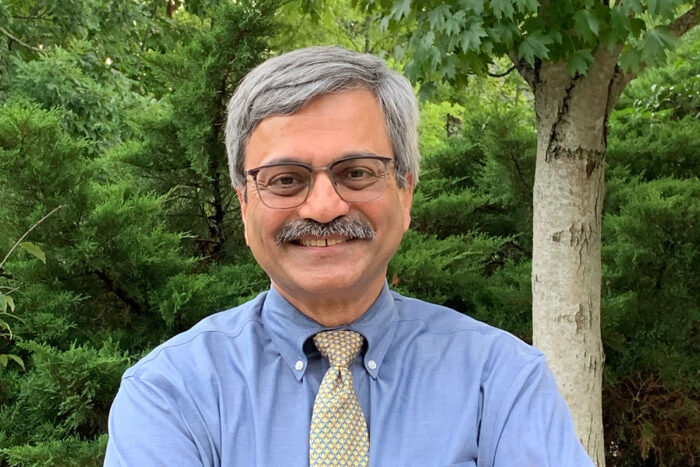Prabhu named cardiovascular division director
Cardiologist’s research focuses on how immune system contributes to heart failure
 Surina E. Prabhu
Surina E. PrabhuSumanth Prabhu, MD, has been named director of the Cardiovascular Division at Washington University School of Medicine in St. Louis. He currently is director of the Division of Cardiovascular Disease at the University of Alabama at Birmingham.
Sumanth D. Prabhu, MD, an internationally recognized expert in how immunity and inflammation contribute to heart failure, has been named director of the Cardiovascular Division in the Department of Medicine at Washington University School of Medicine in St. Louis. He also will become cardiologist-in-chief at Barnes-Jewish Hospital and the Tobias and Hortense Lewin Distinguished Professor of Cardiovascular Diseases at the School of Medicine when his appointment begins Sept. 1.
Prabhu currently is the director of the Division of Cardiovascular Disease and the Mary G. Waters Chair of Cardiovascular Medicine at the University of Alabama at Birmingham.
“I am delighted to welcome Dr. Prabhu to Washington University,” said Victoria J. Fraser, MD, the Adolphus Busch Professor and head of the Department of Medicine. “He is a distinguished physician-scientist, and I know that he will continue to excel and develop the outstanding work of the Cardiovascular Division here at the School of Medicine. Dr. Prabhu has significant experience in cardiovascular disease leadership, clinical operations, research, training and mentoring. He also has made seminal contributions to the field of inflammation and immune mediated heart disease through basic, clinical and translational research. I am confident the division will continue to thrive under his leadership, and we look forward to welcoming him to Washington University.”
Prabhu’s research is focused on understanding how the immune system can drive changes in the heart that play important roles in acute and chronic heart failure. His work has shed light on how altered function of immune cells such as macrophages and T-cells can drive heart failure.
He currently is investigating how disruptions in the day-night circadian rhythms of macrophages promote inflammation in heart failure, and how such immune cells could be targets for developing new therapies for various types of heart failure. Prabhu also collaborates with colleagues regarding treatment protocols for patients with continuous flow ventricular assist devices; small 3D tissue models for cardiovascular development and disease; metabolic rhythm alterations as a cause for heart disease related to obesity; and integrated cellular and tissue engineering models of heart disease.
Prabhu earned his medical degree from Jefferson Medical College in Philadelphia and completed his residency in internal medicine at the University of Pittsburgh. He continued his training with a cardiology fellowship at the University of Texas Health Science Center in San Antonio, where he later joined the faculty. Before being recruited to the University of Alabama at Birmingham, he also served on the faculty of the University of Louisville.
Prabhu is board certified in internal medicine, cardiovascular disease, and advanced heart failure and transplant cardiology. He is a member of the American Society for Clinical Investigation, the American Clinical and Climatological Association, and the Association of University Cardiologists. He is president of the Southern Society for Clinical Investigation, and he serves on the scientific committee of the Sarnoff Cardiovascular Research Foundation. He is also a councilor for the Association of Professors of Cardiology.
Prabhu has received a number of honors and awards, including being named an established investigator of the American Heart Association and mentor of the year for the junior faculty division of the Southern Society for Clinical Investigation. He is an associate editor for the journal Circulation Research and an editorial consultant for the Journal of the American College of Cardiology: Basic to Translational Science. He has served as a National Institutes of Health (NIH) reviewer for a number of special emphasis panels and scientific review groups, and also has served on the study sections on Cardiac Contractility, Hypertrophy and Failure, and Mentored Patient-Oriented Research. He is also the vice chair for the American Heart Association Basic Cardiovascular Sciences Specialty Conference Program Committee.
Prabhu’s new role previously was held by Douglas L. Mann, MD, the Tobias and Hortense Lewin Professor of Medicine, a renowned heart failure expert who led the Cardiovascular Division for 10 years, from 2009 to 2019. Gregory A. Ewald, MD, a professor of medicine, became the interim division director in 2019, when Mann stepped down.
“Dr. Mann led the Cardiovascular Division through a period of significant growth, expanding basic and translational research and growing the clinical operations,” Fraser said. “Dr. Mann remains a dedicated physician-scientist, outstanding clinician and mentor at Washington University. I am grateful for his leadership and accomplishments in cardiology here. I am also grateful for Dr. Ewald’s service as interim director, especially at such a challenging time. He has overseen innovative approaches to providing exceptional care for patients with and without COVID-19 throughout the pandemic.”






